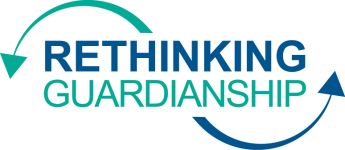Our Common Agenda
To promote less restrictive alternatives to guardianship; and,
To effect long-term changes in North Carolina’s guardianship system.
Why Rethink Guardianship?
Data collected by the NC Division of Aging and Adult Services about public guardianship show that are older adults are no longer the majority of people subject to guardianship in North Carolina. Public guardians serve more than 5,000 adults in the state. Nearly 3,000 (56%) of these adults are younger adults (age 18-59 years old). The majority of these younger adults (86%) have a primary diagnosis of intellectual and other developmental disabilities (I/DD) or mental illness.
Of older adults 60-84 years, who comprise 37% of adults served by public guardians, almost half (48%) have a primary diagnosis of I/DD or mental illness. The number of younger adults with I/DD, mental illness, and traumatic brain injury is expected to grow. Factors such as aging out of foster care, aging parents no longer able to care for adult children, effects of the Olmstead decision and North Carolina’s voluntary settlement agreement with the US Department of Justice, and veterans who have suffered traumatic brain injury account for some of this expected growth.
Current guardianship policies and procedures are not always sensitive to the unique needs of adults with intellectual and other developmental disabilities.
Our initiative aims to inform future policies and procedures for adult guardianship. That way, the institution of guardianship can better meet the needs of all of North Carolina’s vulnerable adults.
Purpose
Our statewide workgroup is a member of the Working Interdisciplinary Networks of Guardianship Stakeholders (WINGS). We employ the Collective Impact model for social change. We continually assess and evaluate North Carolina’s guardianship system to determine when formal or informal adaptations are needed. This includes examining the use of less restrictive alternatives to guardianship such as advance directives and supported decision-making (SDM) to avoid the appointment of an individual or public entity as guardian. The workgroup also provides support and resources to private and public guardians to enable the least restrictive guardianship possible.
Core Concepts and Basic Principles
When looking at guardianship and the principles that should govern, Rud Turnbull, JD, LLD, has reminded us that there are Core Concepts and Basic Principles rooted in federal law and the United Nations Convention on the Rights of Persons with Disabilities (UNCRPD). These concepts and principles recognize that the rights of individuals with disabilities are equal to those of persons without disabilities under the law (UNCRPD; Americans with Disabilities Act, other federal and state laws).
Specifically, Rethinking Guardianship’s core concepts and basic principles include autonomy, liberty, freedom, dignity, the presumption of competence; and the right to lifetime decision-making support.
Our long-term desired outcomes consist of the following:
- A guardianship system that is less restrictive and based on best practices.
- A guardianship process in which all stakeholders are identified and engaged.
- Options and pathways toward guardianship and alternatives to guardianship that are communicated to and understood by all stakeholders.
- A public and private guardianship system that is held accountable.
- Information about guardianship and its alternatives that is available and easily accessible.

